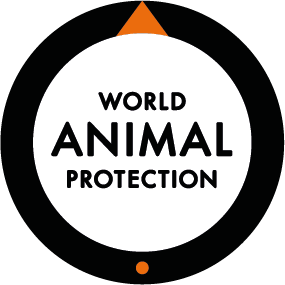Glyphosate
Glyphosate is one of the most widely used herbicides worldwide, primarily on corn, soybeans, hay, and pastures, all of which relate directly to the feeding of livestock.
In 2018, a total of 171.5 million pounds of glyphosate were applied to corn and soy in the US; about 59% of these are attributable to farmed animal feed production.
Population Decline
While its use on corn and soy in the US has decreased slightly in recent years due to the emergence of glyphosate-resistant “superweeds” that can withstand deadly doses of the chemical, glyphosate remains one of the most used pesticides on corn and soy. This is directly tied to the deregulation and marketing of genetically engineered “Roundup Ready” corn and soy crops that are designed to withstand glyphosate.
Glyphosate has been shown to reduce species richness in aquatic communities and overall biodiversity. Some of the animals imperiled by the use of glyphosate in agriculture are:
Human Health Concern
Human health is affected when pesticides are used as well:
- Surrounding populations: People living, working, or going to school in areas near fields where pesticides are used are exposed to the drift and air quality pollution that comes from spraying.
- Pregnant people: Studies looking at the effects on pregnant people living near these sites show that children with high prenatal exposure to pesticides show greater signs of developmental delays than those with low prenatal exposure.
- Pesticide exposure causes farmworkers to suffer more chemical-related injuries and illnesses than any other workforce nationwide.
Occupational exposure to pesticide poisons as many as 20,000 farm workers every year, according to estimates by the EPA. Over 13,000 lawsuits have been filed in the US related to glyphosate alone, alleging that the chemical causes non-Hodgkin’s lymphoma, and scientific studies show a strong correlation between glyphosate and the disruption of hormones, damage to beneficial gut bacteria and DNA, developmental and reproductive toxicity, birth defects, neurotoxicity, and other cancers.
How Can You Help?
Let’s end cruel factory farming, its dependence on unsustainable animal feed, and the destructive forces it unleashes on communities, our climate, and wild animal habitats around the world. Through reducing the role of meat and dairy in our diets we can curb the growth of factory farming and reduce our collective and individual pesticide footprint.
Need help? Sign up for World Animal Protection’s Meating Halfway, a 21-Day Journey to Reduce Your Meat Consumption. You’ll get the support you need to eat less meat a few days a week or one plant-based meal per day.
--
Read the full report here.
